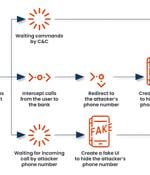Security News

Google has warned that a security flaw impacting its Android operating system has come under active exploitation in the wild. The vulnerability, tracked as CVE-2024-43093, has been described as a...

Cybersecurity researchers have discovered a new version of a well-known Android malware family dubbed FakeCall that employs voice phishing (aka vishing) techniques to trick users into parting with...

A new version of the FakeCall malware for Android hijacks outgoing calls from a user to their bank, redirecting them to the attacker's phone number instead. [...]

A hybrid espionage/influence campaign conducted by the Russian threat group 'UNC5812' has been uncovered, targeting Ukrainian military recruits with Windows and Android malware. [...]

To safeguard your data, Google Chrome uses Safe Browsing to protect you from: harmful websites and extensions, malicious or intrusive advertisements, malware, phishing attacks, and social...

Azure Blob Storage, AWS, and Twilio keys all up for grabs An analysis of widely used mobile apps offered on Google Play and the Apple App Store has found hardcoded and unencrypted cloud service...

Multiple popular mobile applications for iOS and Android come with hardcoded, unencrypted credentials for cloud services like Amazon Web Services (AWS) and Microsoft Azure Blob Storage, exposing...

A lost, stolen, or compromised smartphone today means we are in serious trouble. Most people have everything related to their personal and professional lives stored on their phones, a fact that...

Android 15 brings enhanced security features to protect your sensitive health, financial, and personal data from theft and fraud. It also introduces productivity improvements for large-screen...

New variants of an Android banking trojan called TrickMo have been found to harbor previously undocumented features to steal a device's unlock pattern or PIN. "This new addition enables the threat...